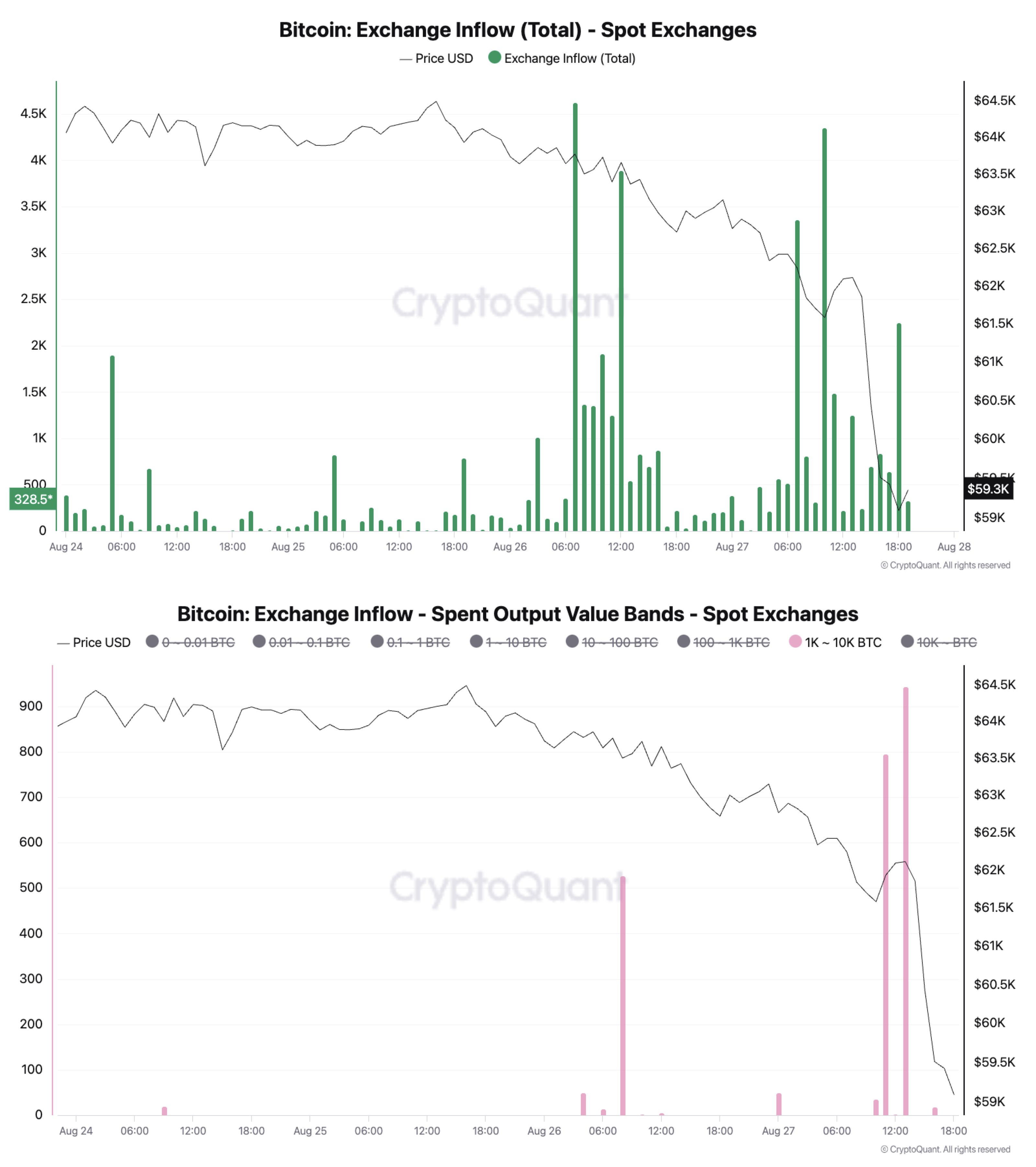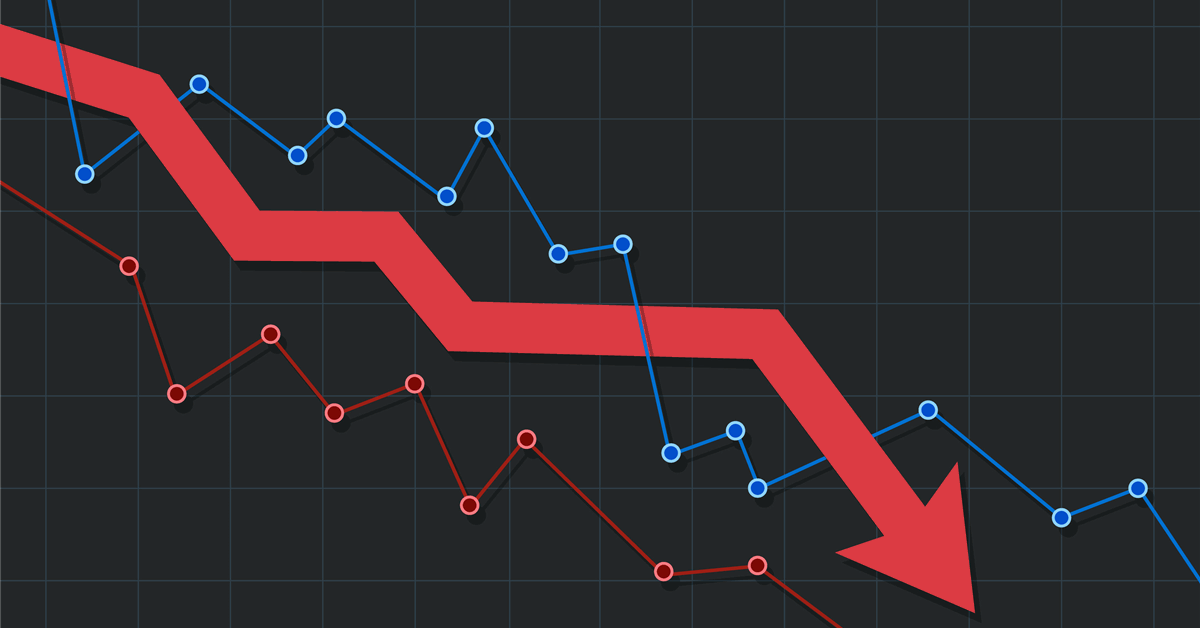Bitcoin Plummets To $59,000, On-Chain Data Reveals Why
Bitcoin has observed a plunge to the $59,000 level during the past day. Here’s what could be behind it, according to on-chain data. Bitcoin Exchange Inflow Spiked Just Before The Crash In a new post on X, CryptoQuant Head of Research Julio Moreno discussed the latest trend in Bitcoin Exchange Inflow. Exchange Inflow is an on-chain metric that tracks the total amount of assets being transferred into the wallets of centralized exchanges. Investors deposit many coins on these platforms when this indicator’s value is high. One of the main reasons holders may transfer to exchanges is for selling-related purposes so this trend can have bearish consequences for BTC’s value. Related Reading: Litecoin Sees Sudden Exodus Of Retail Investors: Why This Can Be Bullish On the other hand, the low metric implies holders aren’t moving that many coins from self-custody into exchanges, which, depending on whether outflows are also occurring, can potentially be bullish for the cryptocurrency. Now, here is the chart shared by Moreno that shows the trend in the Bitcoin Exchange Inflow over the past few days: As displayed in the graph at the top, the Bitcoin Exchange Inflow saw some notable spikes in the lead-up to the latest price plunge. The version of the indicator in the chart is specifically for the spot platforms, so selling was likely the goal of the investors making these deposits. The CryptoQuant head has also attached the data for another metric: the Spent Output Value Bands version of the Exchange Inflow, under the chart for the Exchange Inflow. This indicator shows how the Exchange Inflow breaks down according to the transactions’ size. In the graph, Moreno has specifically highlighted the 1,000 to 10,000 BTC value band, corresponding to addresses carrying between 1,000 and 10,000 tokens in their balance. Investors of this scale are popularly known as the whales and are considered among the market’s most influential entities. As the chart shows, the Exchange Inflow for these large Bitcoin holders also spiked alongside the spikes in the general metric, implying that the whales contributed to some of the deposits. Related Reading: Solana, Ethereum Attract Traders Amid Bitcoin Open Interest Plunge Given the timing of the inflows made by these humongous investors, it’s probable that this selling was partially responsible for the bearish price action the cryptocurrency witnessed during the past day. As such, the indicator could be worth monitoring shortly, as more large deposits could suggest that the Bitcoin sellers aren’t done yet. BTC Price At the time of writing, Bitcoin is floating around $59,900, down almost 4% over the last 24 hours. Featured image from Dall-E, CryptoQuant.com, chart from TradingView.com

Bitcoin has observed a plunge to the $59,000 level during the past day. Here’s what could be behind it, according to on-chain data.
Bitcoin Exchange Inflow Spiked Just Before The Crash
In a new post on X, CryptoQuant Head of Research Julio Moreno discussed the latest trend in Bitcoin Exchange Inflow. Exchange Inflow is an on-chain metric that tracks the total amount of assets being transferred into the wallets of centralized exchanges.
Investors deposit many coins on these platforms when this indicator’s value is high. One of the main reasons holders may transfer to exchanges is for selling-related purposes so this trend can have bearish consequences for BTC’s value.
On the other hand, the low metric implies holders aren’t moving that many coins from self-custody into exchanges, which, depending on whether outflows are also occurring, can potentially be bullish for the cryptocurrency.
Now, here is the chart shared by Moreno that shows the trend in the Bitcoin Exchange Inflow over the past few days:

As displayed in the graph at the top, the Bitcoin Exchange Inflow saw some notable spikes in the lead-up to the latest price plunge. The version of the indicator in the chart is specifically for the spot platforms, so selling was likely the goal of the investors making these deposits.
The CryptoQuant head has also attached the data for another metric: the Spent Output Value Bands version of the Exchange Inflow, under the chart for the Exchange Inflow.
This indicator shows how the Exchange Inflow breaks down according to the transactions’ size. In the graph, Moreno has specifically highlighted the 1,000 to 10,000 BTC value band, corresponding to addresses carrying between 1,000 and 10,000 tokens in their balance.
Investors of this scale are popularly known as the whales and are considered among the market’s most influential entities. As the chart shows, the Exchange Inflow for these large Bitcoin holders also spiked alongside the spikes in the general metric, implying that the whales contributed to some of the deposits.
Given the timing of the inflows made by these humongous investors, it’s probable that this selling was partially responsible for the bearish price action the cryptocurrency witnessed during the past day.
As such, the indicator could be worth monitoring shortly, as more large deposits could suggest that the Bitcoin sellers aren’t done yet.
BTC Price
At the time of writing, Bitcoin is floating around $59,900, down almost 4% over the last 24 hours.
What's Your Reaction?
























































































































.gif)
